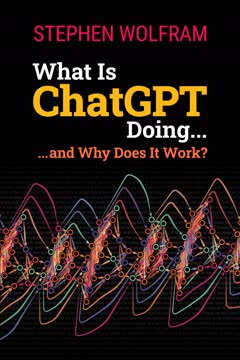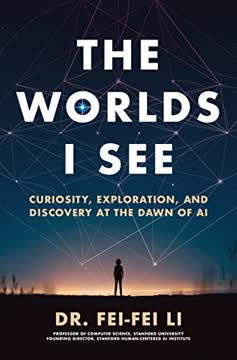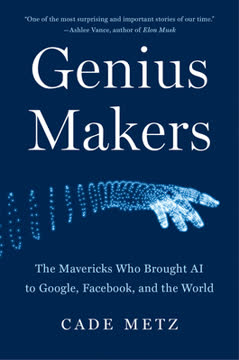Key Takeaways
1. GPT-4: A revolutionary AI with profound implications for healthcare
GPT-4 is in a constant state of evolution and improvement, and we have found during our time with it that problems that stumped the system in the past sometimes are less troublesome for it today.
Unprecedented capabilities. GPT-4 represents a significant leap in artificial intelligence, demonstrating human-like language understanding and generation across various domains, including medicine. Its ability to process and analyze vast amounts of medical information, engage in complex problem-solving, and provide context-aware responses makes it a powerful tool for healthcare professionals.
Potential applications. In healthcare, GPT-4 shows promise in:
- Assisting with diagnoses and treatment recommendations
- Answering patient questions and providing health information
- Summarizing and analyzing medical research
- Generating medical documentation and reports
- Supporting medical education and training
However, it's crucial to note that while GPT-4's capabilities are impressive, it is not infallible and should be used as a tool to augment human expertise rather than replace it entirely.
2. AI as a medical assistant: Enhancing diagnosis and treatment decisions
GPT-4 can generate plausible and evidence-based hypotheses, interpret complex laboratory results, recognize the diagnosis of both common as well as rare and life-threatening conditions, and provide relevant references and explanations.
Diagnostic support. GPT-4 can assist healthcare providers by analyzing patient data, symptoms, and medical history to generate differential diagnoses and suggest appropriate tests or treatments. This can be particularly valuable in cases of rare diseases or complex presentations, where the AI's vast knowledge base can complement the physician's expertise.
Clinical decision-making. The AI can:
- Provide evidence-based treatment recommendations
- Alert providers to potential drug interactions or contraindications
- Offer personalized care plans based on patient-specific factors
- Help interpret complex test results and imaging studies
While GPT-4 can significantly enhance clinical decision-making, it's essential to maintain human oversight and verify AI-generated recommendations to ensure patient safety and optimal care.
3. The ethical dilemma: Understanding vs. simulating intelligence in AI
Does GPT-4 come up with its words and ideas intentionally, or are its outputs just the result of a mindless pattern-matching process, just stitching words together without any true understanding?
The nature of AI intelligence. The question of whether GPT-4 truly "understands" or merely simulates understanding remains a subject of debate among researchers and philosophers. This distinction has important implications for how we approach and utilize AI in healthcare settings.
Implications for medical use. Regardless of the philosophical debate, GPT-4's ability to process and generate human-like responses has practical applications in medicine:
- Enhancing communication between healthcare providers and patients
- Assisting in medical education and training
- Supporting clinical research and literature reviews
However, the uncertainty surrounding AI's true comprehension emphasizes the need for human oversight and verification of AI-generated information in medical contexts.
4. AI's potential to alleviate healthcare staff shortages and burnout
There will surely be widespread demand among people with and without diagnosed mental illnesses for therapeutic relationships with GPT-4 because there's such a huge gap to be filled.
Addressing workforce challenges. GPT-4 and similar AI systems have the potential to alleviate some of the pressing issues facing healthcare systems worldwide, including staff shortages and burnout. By automating routine tasks and providing decision support, AI can help healthcare providers focus on more complex and patient-centered aspects of care.
Applications in mental health. AI-powered chatbots and virtual therapists could help address the shortage of mental health professionals by:
- Providing initial screenings and triage
- Offering support for mild to moderate mental health concerns
- Complementing human-led therapy sessions
However, it's crucial to carefully consider the ethical implications and limitations of AI in mental health care, ensuring that human oversight and intervention remain central to patient care.
5. Streamlining medical paperwork and administrative tasks with AI
GPT-4 can indeed make things like writing notes less time-consuming. But then the question is, where can the freed-up time best be used?
Reducing administrative burden. GPT-4 can significantly streamline various administrative tasks in healthcare, including:
- Generating clinical documentation and medical notes
- Assisting with insurance claims and prior authorizations
- Creating patient education materials and discharge summaries
- Translating medical jargon into patient-friendly language
Improving efficiency and quality. By automating these tasks, healthcare providers can:
- Spend more time on direct patient care
- Reduce errors in documentation and coding
- Improve the overall quality and consistency of medical records
- Enhance communication between providers and patients
While AI can greatly improve administrative efficiency, it's important to maintain human oversight to ensure accuracy and address complex or nuanced situations.
6. Accelerating medical research and drug development through AI
GPT-4 can read highly technical research papers and then engage in remarkably sophisticated discussions.
Enhancing literature review. GPT-4 can rapidly analyze and synthesize vast amounts of medical literature, helping researchers:
- Identify relevant studies and emerging trends
- Generate hypotheses for further investigation
- Summarize complex findings for various audiences
Supporting drug discovery. AI can accelerate the drug development process by:
- Predicting potential drug candidates
- Analyzing molecular interactions and drug efficacy
- Identifying potential side effects and drug interactions
- Optimizing clinical trial design and patient selection
While AI can significantly speed up research processes, human expertise remains crucial for interpreting results, designing studies, and making ethical decisions in research and drug development.
7. Balancing innovation with patient safety in AI regulation
For now, though, Halamka divides the uses for new AI models into two broad groups: low risk and high risk. Uses that are low risk to patients — writing insurance letters, for example — will need little new oversight or regulation. Those that are higher risk and could directly affect patients, he said, should have "mandated human review" — editing, sign-off, and liability falling on that human if something goes wrong.
Regulatory challenges. As AI technologies rapidly evolve, regulators face the challenge of balancing innovation with patient safety. Key considerations include:
- Defining appropriate levels of oversight for different AI applications
- Establishing standards for AI model transparency and explainability
- Developing frameworks for testing and validating AI systems in healthcare
- Addressing liability issues in AI-assisted medical decision-making
Adaptive regulation. Given the rapid pace of AI development, regulatory approaches should be flexible and adaptable, allowing for:
- Continuous monitoring and assessment of AI systems in real-world settings
- Regular updates to guidelines based on emerging evidence and best practices
- Collaboration between regulators, healthcare providers, and AI developers
8. Addressing bias and ensuring equitable access in AI-powered healthcare
GPT-4 tends to hedge and be very conservative in its pronouncement, likely because of the human-driven reinforcement learning described by Peter in Chapter 6. So even though GPT-4's response included the right answer it also included less important and wrong responses.
Identifying and mitigating bias. AI systems can inadvertently perpetuate or exacerbate existing biases in healthcare. To address this issue:
- Regularly assess AI models for bias across different demographic groups
- Ensure diverse representation in training data and development teams
- Implement transparency measures to allow scrutiny of AI decision-making processes
Promoting equitable access. As AI becomes more prevalent in healthcare, it's crucial to ensure that its benefits are accessible to all populations:
- Develop AI tools that can function effectively across different languages and cultures
- Address disparities in digital access and literacy
- Ensure that AI-powered healthcare solutions are affordable and widely available
Ongoing monitoring and adjustment of AI systems are necessary to prevent the amplification of existing healthcare disparities and promote equitable outcomes for all patients.
9. The future of medicine: AI as a partner, not a replacement
GPT-4's potential to help with the great flood of pseudoscientific health advice some call goop? With the better lifestyle choices — eating, exercise, sleep, substance use — that ideally are made based on solid science, and that determine so much about the state of our health?
Augmenting human expertise. The future of medicine lies in the synergy between human healthcare providers and AI systems. GPT-4 and similar technologies should be viewed as tools to enhance, rather than replace, human decision-making and patient care.
Potential benefits:
- More accurate diagnoses and personalized treatment plans
- Improved patient education and engagement
- Enhanced efficiency in healthcare delivery
- Accelerated medical research and innovation
Challenges to address:
- Ensuring appropriate integration of AI into clinical workflows
- Maintaining the human touch in patient care
- Addressing ethical concerns around AI use in healthcare
- Continuous education and training for healthcare providers on AI technologies
As AI continues to evolve, it will be crucial to strike a balance between leveraging its capabilities and preserving the irreplaceable aspects of human care and judgment in medicine.
Last updated:
FAQ
What's The AI Revolution in Medicine: GPT-4 and Beyond about?
- Exploration of AI in Medicine: The book delves into how AI, especially GPT-4, is revolutionizing healthcare by enhancing disease detection, diagnosis, and patient care.
- Opportunities and Risks: It discusses the potential benefits of AI in reducing healthcare inequities and the risks associated with its implementation.
- Ethical Dialogue: The authors call for ongoing discussions about the ethical implications and responsibilities of integrating AI into medical practice.
Why should I read The AI Revolution in Medicine: GPT-4 and Beyond?
- Insightful Perspectives: The book offers a comprehensive overview of AI's capabilities in medicine, essential for anyone interested in the future of healthcare.
- Expert Contributions: Written by Peter Lee, Carey Goldberg, and Isaac Kohane, the authors bring extensive knowledge from both technology and medicine.
- Practical Guidance: It provides practical advice on safely and effectively using AI tools like GPT-4 in clinical settings.
What are the key takeaways of The AI Revolution in Medicine: GPT-4 and Beyond?
- AI's Transformative Potential: AI can significantly enhance medical practice, from diagnostics to patient management.
- Need for Caution: Careful management and oversight are crucial to ensure AI's benefits outweigh its risks.
- Human-AI Collaboration: The authors advocate for a partnership model where AI augments human capabilities rather than replacing them.
What are the best quotes from The AI Revolution in Medicine: GPT-4 and Beyond and what do they mean?
- "The development of AI is as fundamental as the creation of the personal computer.": Bill Gates emphasizes AI's revolutionary impact on life, particularly healthcare.
- "GPT-4 has game-changing potential to improve medicine and health.": This underscores the authors' belief in AI's ability to enhance healthcare delivery and patient outcomes.
- "Trust but verify.": This phrase highlights the need for human oversight when using AI in medicine.
How does GPT-4 improve disease detection and diagnosis according to The AI Revolution in Medicine?
- Data Analysis: GPT-4 can quickly analyze vast amounts of medical data, identifying patterns that may not be apparent to human practitioners.
- Real-time Assistance: It provides immediate support to healthcare professionals during patient consultations, offering evidence-based recommendations.
- Personalized Care: By integrating patient data, GPT-4 helps tailor treatment plans to individual needs, improving overall patient outcomes.
What are the limitations of using GPT-4 in medicine as outlined in The AI Revolution in Medicine?
- Hallucination Risks: GPT-4 can generate incorrect or misleading information, posing significant risks in clinical settings.
- Lack of Emotional Understanding: While it can simulate empathy, GPT-4 lacks true emotional intelligence, crucial in patient care.
- Dependence on Human Oversight: AI should not replace human judgment; it should support healthcare providers.
How can GPT-4 assist in reducing healthcare inequities according to The AI Revolution in Medicine?
- Access to Information: GPT-4 democratizes access to medical knowledge, providing reliable information to underserved populations.
- Remote Consultations: It facilitates telemedicine, allowing patients in remote areas to receive medical advice without traveling.
- Culturally Tailored Resources: The AI generates health information that is linguistically and culturally appropriate, improving understanding and compliance.
What ethical considerations are discussed in The AI Revolution in Medicine: GPT-4 and Beyond?
- Patient Privacy: Concerns about data security and the ethical use of patient information in AI systems are addressed.
- Bias in AI: The potential for AI to perpetuate existing biases in healthcare is highlighted, emphasizing careful monitoring.
- Informed Consent: Ensuring patients understand how AI is used in their care is crucial.
How does The AI Revolution in Medicine suggest integrating AI into clinical practice?
- Training and Education: Healthcare professionals should be trained on effectively using AI tools like GPT-4.
- Collaborative Approach: AI should act as a partner to healthcare providers, enhancing their capabilities.
- Continuous Evaluation: Ongoing assessment of AI's performance and impact on patient care is essential.
What role does regulation play in the use of AI in healthcare according to The AI Revolution in Medicine?
- Establishing Safety Standards: Regulatory frameworks are needed to ensure AI technologies are safe and effective for patient use.
- Monitoring for Bias and Fairness: Regular assessments are crucial to prevent discrimination against marginalized populations.
- Balancing Innovation and Caution: Regulation should not stifle innovation but protect patient safety and rights.
How can AI help with medical research as discussed in The AI Revolution in Medicine?
- Accelerating Clinical Trials: AI streamlines the design and conduct of clinical trials, reducing time and cost.
- Identifying Research Gaps: AI analyzes existing literature to identify areas needing further research.
- Enhancing Data Analysis: AI assists researchers in analyzing complex datasets, uncovering new insights.
What future developments in AI and medicine are anticipated in The AI Revolution in Medicine?
- Advancements in AI Technology: Future AI systems may surpass human intelligence in certain medical tasks.
- Broader Applications: AI is expected to expand beyond diagnostics to include treatment recommendations and patient monitoring.
- Public Discourse: A robust public discussion about AI's implications in healthcare is needed, emphasizing ethical guidelines and regulations.
Review Summary
The AI Revolution in Medicine receives mixed reviews, with an average rating of 3.96/5. Readers appreciate its overview of AI's potential in healthcare, particularly GPT-4's applications. Many find it informative and thought-provoking, praising its accessibility and real-world examples. However, some criticize its focus on Microsoft products and GPT-4, lack of technical depth, and repetitive AI-generated content. Concerns are raised about AI's limitations, ethical implications, and regulatory challenges in medicine. Overall, it's considered a timely exploration of AI's impact on healthcare, despite its shortcomings.
Similar Books










Download PDF
Download EPUB
.epub digital book format is ideal for reading ebooks on phones, tablets, and e-readers.




